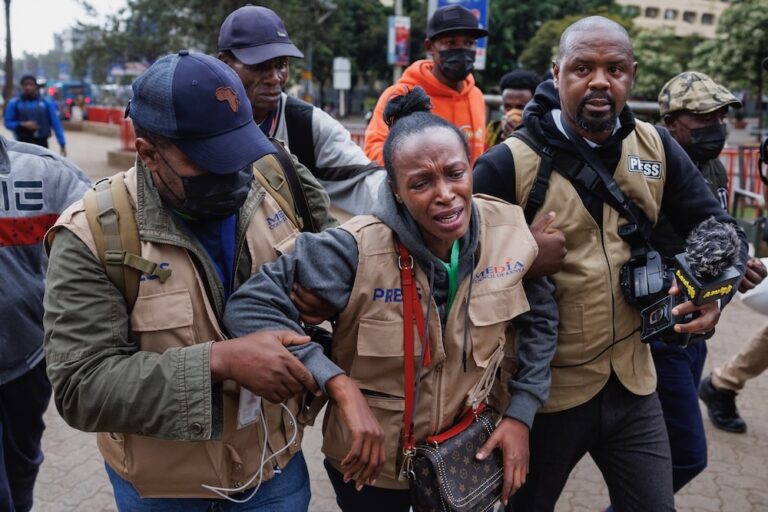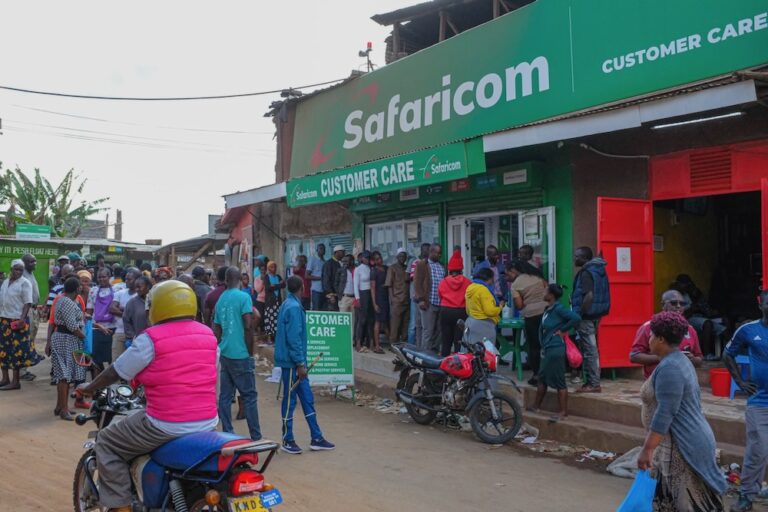(NDIMA/IFEX) – Almost two years after applying to the Non-Governmental Organisations Bureau (N-GOB) for registration as a non-governmental organisation (NGO), IFEX member NDIMA has been notified in a certificate signed by Bureau board chairman J.K. Etemesi that it has been refused registration. A letter dated 15 December 1997 advised NDIMA that it had sixty days […]
(NDIMA/IFEX) – Almost two years after applying to the Non-Governmental
Organisations Bureau (N-GOB) for registration as a non-governmental
organisation (NGO), IFEX member NDIMA has been notified in a certificate
signed by Bureau board chairman J.K. Etemesi that it has been refused
registration. A letter dated 15 December 1997 advised NDIMA that it had
sixty days in which to appeal the board’s decision if it was not satisfied
with the Bureau’s ruling, which it could do by contacting the Minister of
State in the Office of the President.
On 6 January 1997, NDIMA’s Programme Coordinator received two letters from
the N-GOB, one acknowledging receipt of NDIMA’s application and the other
approving the name of the organisaton. On 28 February 1998, NDIMA received
both the certificate of refusal signed by Etemesi and the N-GOB’s letter of
15 December, in an envelope postmarked 25 February 1998. This has meant that
the sixty-day appeal period (which began on 15 December 1997) expired while
the letter was still in the hands of the N-GOB.
Failure to receive registration as a non-governmental organisation would
render NDIMA an illegal organisation and mean that it could not operate
under Kenyan laws.
On 4 March 1998, Laibuta & Associates Advocates, the law firm which prepared
NDIMA’s application for registration as an NGO, said they will appeal
against the N-GOB’s decision. The law firm also noted that the decision had
not been communicated to them.
According to NDIMA, the Kenyan government is increasingly scared of any
international forum that reports on human rights violations in Kenya. NDIMA
believes that its work in human rights/freedom of expression made the
Non-Governmental Organisation Bureau uneasy, and resulted in its denial of
registration.
Background Information
NDIMA was founded in Harare, Zimbabwe in August 1993 in direct response to
governmental crackdowns on the independent and alternative media. NDIMA has
six main programmes: election monitoring, NDIMA Special Reports, NDIMAlert,
“Ngao”, “Letter from Nairobi” and Operation fREADom. Operation fREADom aims
at making restricted works by African writers available to readers. It also
works to support the publication, performance and promotion of censored
works and to provide financial support to journalists and writers whose
tools have been destroyed as a result of censorship. NDIMAlert is a
programme designed to expose violations of human rights and the freedom of
expression. NDIMA Special Reports is a programme through which issues
relating to human rights and the freedom of expression are investigated and
reported on. “Ngao” is NDIMA’s monthly newsletter.
Owing to an influx of displaced writers seeking help, especially from
Ethiopia, NDIMA has created a seventh programme called the Refugee Care and
Support programme (RECASU). NDIMA has plans to build a
secretariat–cum–writers residence where these writers can find shelter
before proceeding to their countries of permanent refuge.
In Africa, NDIMA has been working closely with the Media Institute of
Southern Africa (MISA), the Kenya Human Rights Commission, Econews Africa,
Freedom of Expression Institute–South Africa, Friedrich Ebert Foundation
Nairobi, Kenya Union of Journalists, Media for Democracy in Africa and the
Media Institute–Nairobi. Global partners include OneWorld Online, the
International Freedom of Expression Exchange Clearing House (and partners),
International PEN and Human Rights Watch. NDIMA also works in collaboration
with the International Parliament of Writers (IPW) and Digital Freedom
Network ( DFN) to publicize and publish persecuted and censored writers and
find them a safe country of refuge.
For further information, contact Sam Mbure or Emily Nyanjugu at NDIMA, PO
Box 70147, Nairobi, Kenya, tel/fax: +254 154 51118, e-mail:
ndima@arcc.or.ke, Internet:http://www.oneworld.org/ndima/.


